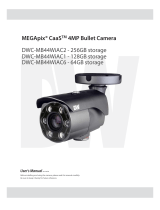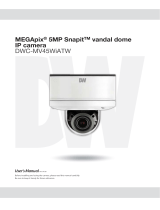
2
WARNING
To prevent damage which may result in fire or electric shock
hazard, do not expose this appliance to rain or moisture.
WARNING
1. Be sure to use only the standard adapter that is
specified in the specification sheet. Using any other
adapter could cause fire, electrical shock, or damage to
the product.
2. Incorrectly connecting the power supply or replacing
the battery may cause an explosion, fire, electric shock,
or damage to the product.
3. Do not connect multiple cameras to a single adapter.
Exceeding the capacity may cause excessive heat
generation or fire.
4. Securely plug the power cord into the power
receptacle. An insecure connection may cause fire.
5. When installing the camera, fasten it securely and
firmly. A falling camera may cause personal injury.
6. Do not place conductive objects (e.g. screwdrivers,
coins, metal items, etc.) or containers filled with water
on top of the camera. Doing so may cause personal
injury due to fire, electric shock, or falling objects.
7. Do not install the unit in humid, dusty, or sooty
locations. Doing so may cause fire or electric shock.
8. If any unusual smells or smoke come from the unit, stop
using the product. Immediately disconnect the power
source and contact the service center. Continued use in
such a condition may cause fire or electric shock.
9. If this product fails to operate normally, contact the
nearest service center. Never disassemble or modify
this product in any way.
10. When cleaning, do not spray water directly onto parts
of the product. Doing so may cause fire or electric
shock.
Precaution
Operating
• Before using, make sure the power supply and all other
parts are properly connected.
• While operating, if any abnormal condition or
malfunction is observed, stop using the camera
immediately and contact your dealer.
Handling
• Do not disassemble or tamper with parts inside the
camera.
• Do not drop the camera or subject it to shock or
vibration as this can damage the camera.
• Clean the clear dome cover with extra care. Scratches
and dust can ruin the quality of the camera image.
Installation and Storage
• Do not install the camera in areas of extreme
temperature, exceeding the allowed range.
• Avoid installing in humid or dusty environments.
• Avoid installing in places where radiation is present.
• Avoid installing in places where there are strong
magnetic fields and electric signals.
• Avoid installing in places where the camera would be
subject to strong vibrations.
• Never expose the camera to rain or water.
Warning
This symbol indicates that dangerous
voltage consisting of a risk of electric
shock is present within this unit.
Precaution
This exclamation point symbol is intended
to alert the user to the presence of
important operating and maintenance
(servicing) instructions in the literature
accompanying the appliance.
Safety Information
CAUTION
RISK OF ELECTRIC SHOCK.
DO NOT OPEN.
CAUTION :
TO REDUCE THE RISK OF ELECTRIC SHOCK, DO NOT REMOVE COVER (OR BACK) NO USER SERVICEABLE
PARTS INSIDE.
REFER SERVICING TO QUALIFIED SERVICE PERSONNEL.





























